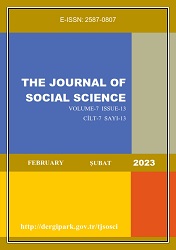MIGRATION FROM TURKEY TO GERMANY: INTEGRATION POLICY AND THE GERMAN LANGUAGE
MIGRATION FROM TURKEY TO GERMANY: INTEGRATION POLICY AND THE GERMAN LANGUAGE
Author(s): Özlem TekinSubject(s): Language studies, Politics and Identity, Asylum, Refugees, Migration as Policy-fields
Published by: Dicle Üniversitesi, Sivil Havacılık Yüksekokulu
Keywords: Migration; Turkey; Germany; Integration policy; German language;
Summary/Abstract: The aim of this article is to assess the extent to which German integration policy with particular regard to the German language has been adopted and modified over time, in the context of Turkish migration to Germany. For this purpose, first the history of migration from Turkey to Germany is outlined, focusing on key events such as the recruitment agreement in the 1960s, the recruitment stop and the ‘return assistance’ in the 1970s and 1980s, the rise of racism in the 1990s and 2000s, and the emergence of the ‘New Turkish Wave’ in the 2010s and 2020s. Subsequently, German integration policy and the role of the German language within it will be traced through different phases: the absence of an integration policy in the 1960s and 1970s, Germany’s status as an ‘immigration country that does not want to be an immigration country’ in the 1980s and 1990s, the transition from an immigration act to an integration policy in the 2000s, and the era of ‘welcome culture’ and concrete integration policy in the 2010s and 2020s. Finally, it will be determined to what extent the integration policy of the Federal Republic of Germany, especially with regard to the German language, is adapted to the lifeworld of Turkish migrants currently living in Germany and thus facilitates their successful integration in Germany.
Journal: The Journal of Social Science
- Issue Year: 7/2023
- Issue No: 14
- Page Range: 143-163
- Page Count: 21
- Language: English

